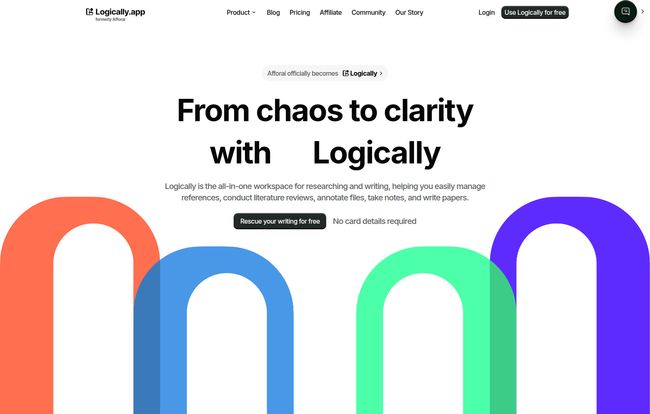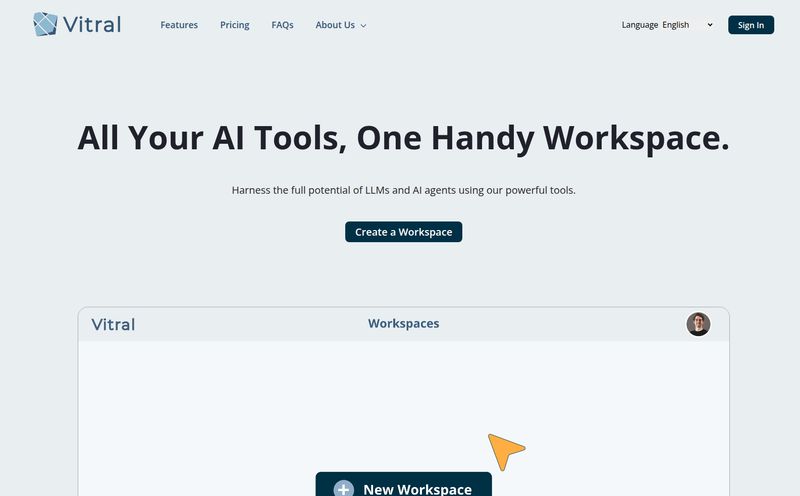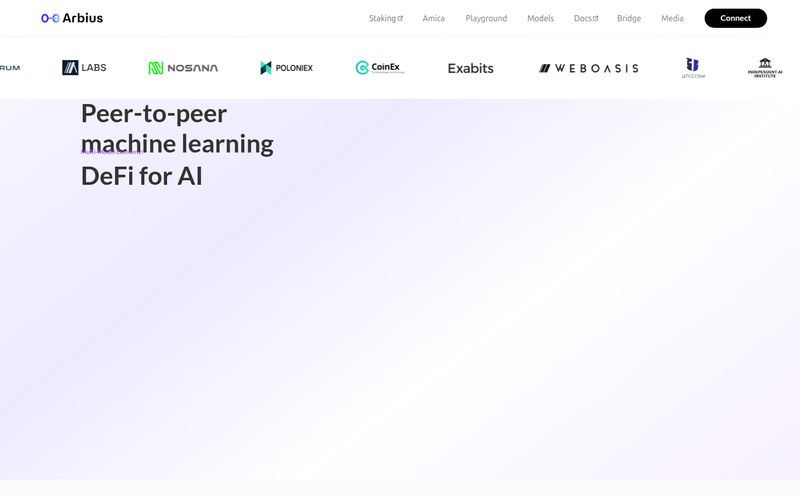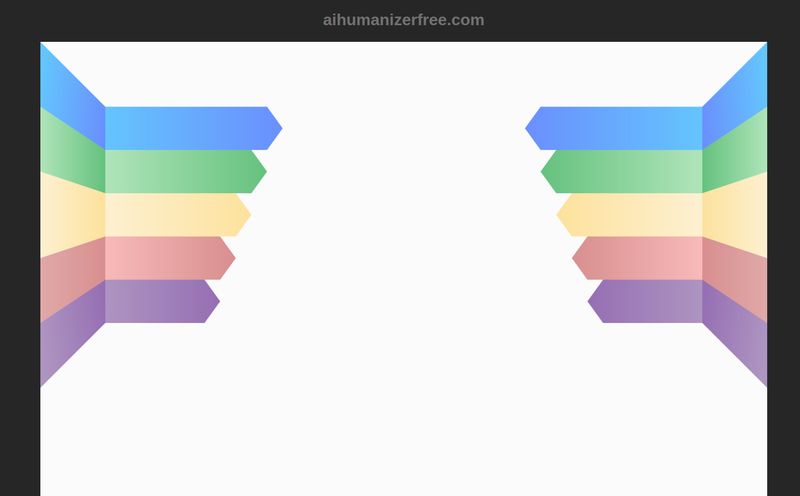If you’re a student, a researcher, or even a content geek like me, your digital workspace is probably a complete and utter disaster zone. I know mine is. Or, well, it was.
My typical “research process” looked something like this: a dozen Chrome tabs flashing with academic papers, another window for ChatGPT to try and make sense of it all, Zotero open on the side threatening to crash, and a half-highlighted PDF saved to my desktop that I’d never find again. It’s a mess. A beautiful, glorious, citation-filled mess that eats up time and sanity. It's the digital equivalent of that one chair in your bedroom covered in clothes.
So, when I stumbled upon a tool called Logically.app, my curiosity was definitely piqued. You might have heard of it under its old name, Afforai. It claims to be an all-in-one AI research assistant, a single place to manage, read, and write. A bold claim. I’ve seen a lot of tools promise to be the “one app to rule them all,” and most of them just end up being another tab I have to keep open. But this one... this one felt a bit different.
So, What Exactly is Logically.app?
Imagine you took a reference manager like Zotero, a PDF reader like Adobe Acrobat, and a powerful AI chatbot like Claude or Gemini, and threw them all into a blender. What you’d get is something pretty close to Logically.app. It’s designed to be a unified workspace that stops you from frantically Alt-Tabbing between five different programs just to write a single paragraph.
At its core, it’s built to help you with the entire research lifecycle:
- Managing all your source files and references.
- Reading and annotating documents directly in the app.
- Conducting literature reviews without losing your mind.
- And, of course, writing your paper with an AI assistant that actually knows what you're talking about because it’s read your sources.
The coolest part? It’s not just leaning on one AI. It says it’s powered by the “best AI models,” specifically name-dropping Claude, Gemini, and ChatGPT. This multi-model approach is smart; it means they're not locked into one ecosystem and can theoretically use the best model for the specific task at hand, whether it's summarizing dense text or translating a tricky passage.

Visit Logically.app (formerly Afforai)
Ditching the Digital Duct Tape: The Features That Matter
Alright, let's get into the nitty-gritty. A tool is only as good as what it actually does. Here’s where Logically tries to pry your fingers off your old, clunky software.
A Reference Manager That Doesn't Make You Weep
I have a love-hate relationship with reference managers. They're essential, but man, can they be a pain. Importing, formatting, syncing... it's a chore. Logically integrates this directly into the workflow. The idea is that as you upload your documents (it supports PDF, EPUB, DOCX, and more), it helps you manage them right there. With over 10,000 citation styles available, it can format your bibliography in pretty much any style a demanding professor could dream up. APA, MLA, Chicago... you name it. No more fighting with a separate program to get your citations just right.
The All-Seeing PDF Annotator
This is a big one for me. I used to have folders upon folders of annotated PDFs with cryptic names like `final_paper_notes_v3_final_FINAL.pdf`. It was not a good system. Logically lets you highlight, add notes, and mark up your files right inside the platform. Because it’s all in one place, your notes and your source material live together in harmony. It seems simple, but the friction it removes is huge. You can finally leave colorful sticky notes all over your digital documents without creating a physical mess.
An AI Assistant That Actually Understands Your Research
Here’s the showstopper. We’ve all used ChatGPT to summarize an article. But Logically’s AI assistant works differently—it bases its answers and summaries on your uploaded documents. This is a game-changer. You can ask it to “Summarize the key findings from these three papers” or “Explain the methodology in this study like I’m a first-year student.” The AI isn’t just pulling from the vast, generic internet; it's pulling from your curated library.
Logically makes some pretty wild claims here, like having “5x better quality and 10x more coverage” than other AI chatbots. While that's hard to quantify, the underlying principle is sound. An AI with direct access to your primary sources is infinitely more useful for academic work than one without that context. It can find citations for you, rewrite sentences for clarity and even explain difficult concepts from within your papers.
The Elephant in the Room: How Much Does This Cost?
Okay, this all sounds great, but what’s the damage to my wallet? The pricing structure is actually one of the most compelling parts of the pitch.
They have a Free plan, and it’s genuinely free—no credit card needed, which I always appreciate. It's your basic test drive. You get limited AI credits, can only upload two documents at a time, and have 500MB of storage. It's enough to get a feel for the platform, but you’ll probably hit those limits pretty quick if you're doing any serious work.
The real deal for most people will be the Unlimited plan. It’s $8 per month if you pay for the year. This unlocks everything: unlimited document uploads, unlimited storage, and unlimited AI access. When you think about it, this is kind of a steal. The site itself points out that a separate writing assistant, PDF annotator, reference manager and premium AI chatbot could easily run you close to $50 a month. Paying $8 to have it all in one place? That's just... logical.
There's also a Team plan for research groups or labs, which starts at $6.80 per user per month. It adds things like an admin portal and centralized billing, which is handy for collaboration.
Plus, they offer a student discount and a 30-day money-back guarantee on the paid plans, which lowers the barrier to entry quite a bit.
My Honest Take: The Good, The Bad, and The Logical
After playing around with it, I'm genuinely impressed. It’s not perfect, but it’s a massive step in the right direction.
The biggest pro is the consolidation. The pure relief of not having to juggle multiple apps is worth the price of admission alone. The workflow feels smooth and intuitive. The AI's ability to work with my own documents is incredibly powerful and saves a ton of time on literature reviews.
On the flip side, the free plan is definitely just a teaser. You can't live on it. And the Team plan requiring a minimum of two users might be a small annoyance for freelancers who only collaborate sporadically. But these are minor gripes in the grand scheme of what the platform offers.
Who Is This Tool Actually For?
I see this being a lifesaver for a few key groups:
- University Students: From undergrad essays to PhD dissertations, this seems like a no-brainer. The student discount makes it even more appealing.
- Academics and Researchers: Managing hundreds of sources for a literature review is a nightmare. This tool is built from the ground up to soothe that particular headache. The testimonial from the professor on their site rings very true.
- Content Creators & Journalists: Anyone who needs to synthesize information from multiple sources to create well-researched articles will find this incredibly useful. It's like having a research assistant on call 24/7.
Basically if your job or studies involve reading a lot of stuff and then writing about that stuff, this is probably for you.
Frequently Asked Questions
Is Logically.app the same as Afforai?
Yes, it is! Logically.app is the new name for the tool previously known as Afforai. It's the same great platform, just with a new brand identity.
Can I get a student discount on Logically.app?
You bet. Logically offers discounts for students. You'll need to sign up for an account using your student email and then contact their support to get the discount applied. It's an extra step, but worth it for the savings.
What AI models does Logically use?
It uses a combination of top-tier models, including OpenAI's GPT, Google's Gemini, and Anthropic's Claude. This gives it a ton of flexibility and power.
How does Logically.app compare to Zotero or Mendeley?
Think of it as Zotero on steroids. While Zotero and Mendeley are fantastic (and free) reference managers, they are just one piece of the puzzle. Logically integrates reference management with a powerful PDF annotator and a research-specific AI assistant, creating a complete, all-in-one workspace.
Is the free plan of Logically.app actually useful?
It's useful for a trial. You can get a solid feel for the interface and features. However, with a 2-document limit and restricted AI access, you won't be able to use it for a full project. It's designed to get you hooked so you'll upgrade to the Unlimited plan.
What happens if I don't like the paid plan?
No worries. They offer a 30-day money-back guarantee on their paid plans. This gives you a full month to put it through its paces on a real project and decide if its right for you.
My Final Thoughts
Look, no tool is a magic bullet that will write your paper for you. But Logically.app comes pretty close to being a magic wand for the process of research and writing. It tames the chaos, streamlines the workflow, and consolidates a pricey stack of software into one affordable subscription.
For me, the mental clarity that comes from having everything in one place is the biggest win. It's not just another tool; it's a better way to work. And in a world where we’re all drowning in information, a tool that helps you find clarity is more than just logical—it's essential.



